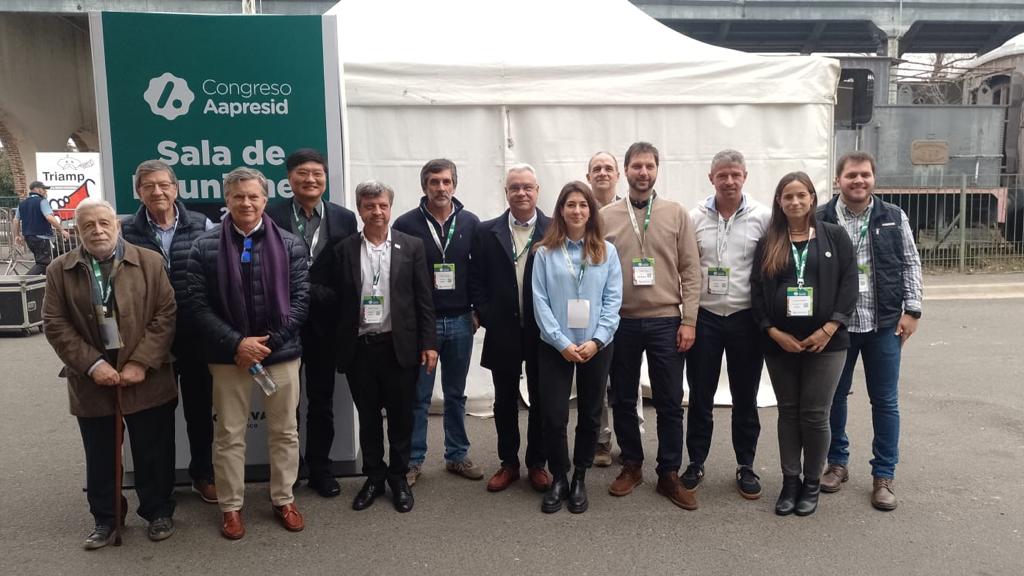The CAAPAS-IICA partnership aims to achieve more informed and robust joint positions for dealings with the international agricultural forums of the Americas

Rosario, Argentina, August 11, 2023 (IICA). Producer associations from across the Americas that form part of a network that promotes sustainable agriculture have joined forces with the Inter-American Institute for Cooperation on Agriculture (IICA) to work together on the dissemination of good environmental practices that improve yields while at the same time contributing to the construction of more prosperous rural areas for their inhabitants.
The decision of the Confederation of American Associations for Sustainable Agriculture (CAAPAS) and IICA to pool resources marks an important step in the sustainable transformation of the region’s agrifood systems. They have signed a framework agreement for technical cooperation that establishes a joint roadmap and specific objectives aimed at extending the region’s good practices and showcasing them to the world.
CAAPAS is an umbrella organization of producers in different countries who share a vision of agriculture and the goal of using conservation-oriented soil management techniques that combine the economically viable use of the resource with long-term sustainability.
The new chair of CAAPAS, Marcelo Torres, and the Director General of IICA, Manuel Otero, signed the IICA-CAAPAS agreement in the Argentine city of Rosario during the Annual Congress of the Asociación Argentina de Productores en Siembra Directa (AAPRESID). The large-scale, three-day event demonstrated the interest of farmers in the Southern Cone in innovation and new technologies aimed at reducing agriculture’s environmental impact. The outgoing chair of CAAPAS, Jonadan Ma, also took part in the signing ceremony.
The focus of CAAPAS, founded in 1992 by producers’ associations from Argentina, Brazil, Chile, Mexico and Uruguay, is the promotion, development, intensification and improvement of no-till farming, an agricultural paradigm that is widely used in the region and mitigates the negative effects of tillage. To that end, this continent-wide network of federations carries out research and training to develop and share new knowledge about soil, manage water more efficiently, and promote environmental conservation.
The CAAPAS-IICA partnership aims to achieve more informed and robust joint positions for dealings with the international agricultural forums of the Americas, a continent that is a powerhouse not only for food production, but also for environmental conservation, as demonstrated by the fact that at least two thirds of the world’s total land under zero tillage is to be found here.
After the cooperation agreement was signed, senior CAAPAS and IICA officials and technical specialists held a working meeting to discuss and reach agreement on the next steps to be taken to involve more producers in sustainable practices with measurable results, including soil carbon sequestration and the reduction of production’s water footprint.
Certification of good practices
“This partnership between CAAPAS and IICA is a first step. Attention now turns to our joint efforts, with a roadmap and specific objectives, and that is a huge challenge,” said Marcelo Torres, the chair of AAPRESID and an agronomist by profession.
“We have high expectations of this partnership, and aim to incorporate many more agricultural producers from across the continent. Some of the challenges we face are measuring soil carbon sequestration and farming’s water footprint and how to certify it,” he added.
Torres explained the importance of intensifying environmental protection practices: “We don’t have more arable land available to scale up production. That is why we have to improve yields and for that we have to work together ¾ producers, scientific systems and political decision-makers.”
Manuel Otero emphasized the intention of, and the need for, the CAAPAS and IICA partnership to have a real impact, both on the wider adoption of the conservation and regenerative practices already being used by farmers across the continent, and the rest of the world’s awareness of the true facts about regional production.
“Much remains to be done in the region: we need to strengthen research work; we must have a greater presence on the international stage; and we have to communicate much more and be more proactive in telling the world what is being done here on behalf of sustainable agriculture,” Otero said.
At the working meeting between CAAPAS and IICA, which was held at the same venue where the AAPRESID Congress took place, the two institutions reached agreement on specific objectives and the activities they will undertake together.
The joint actions will include efforts to strengthen CAAPAS, in order to increase the number of organized producers that apply sustainable practices, with emphasis on the function of soils as carbon sinks, which also reinforces the role of agriculture as part of the solution to climate change.
Federico Villarreal, IICA’s Director of Technical Cooperation, explained that the partners will also promote the participation of producers in international forums where decisions are taken on agricultural and environmental issues.
More information:
Institutional Communication Division.
comunicacion.institucional@iica.int











